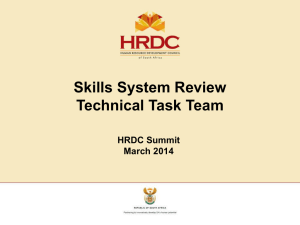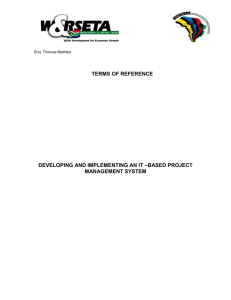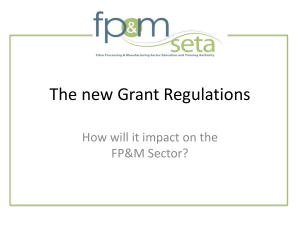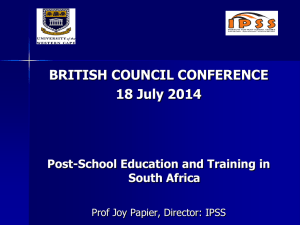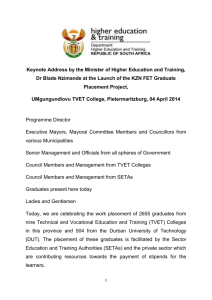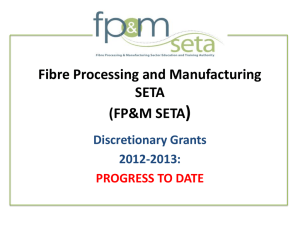The White Paper on Post School Education and Training
advertisement
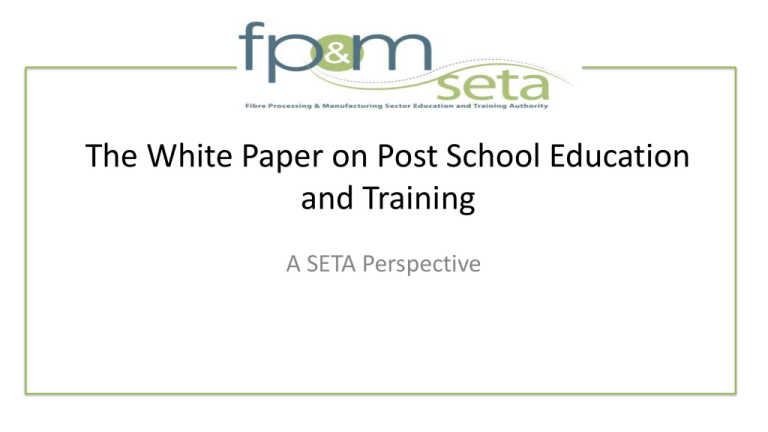
The White Paper on Post School Education and Training A SETA Perspective The White Paper • Approved by Cabinet on 20 November 2013 • Set scene for Post School Education and Training to be achieved by 2030. • Single, coordinated post school system – Inclusive access – Improved capacity – Quality provision responding to needs of learners, employers and community The White Paper • Post school education and training is aimed at people – Who have completed school – Who did not complete school – Who never attended school • Details the role of all institutions – Public and private higher and further education institutions – Adult learning centres – SETAs, NSF, Regulatory Bodies and Quality Councils Partnerships • Growth of Technical and Vocational Education and Training (TVET) Colleges (previously FET Colleges) remains DHET priority • New system require stronger and more cooperative relationships between Education and Training Institutions and Workplace to facilitate – Placement of students for work integrated learning – Regular interaction to access information on industry developments and industry skills needs. Partnerships • University sector supports integrated post school system • Some have entered into partnerships with other institutions eg. TVET Colleges • Important to foster relationships with employers to expand work placement opportunities Role of the SETA • Facilitating close cooperation between institutions / training providers and employers to design vocational training interventions • SETA focus on – Skills development of sector employees – Development of skills pipeline – Stakeholder liaison – identifying the skills needs of workplaces and ensuring provider capacity to address these needs. • Role of the NSF • Responsible for skills development aligned to national development strategies • Providing funding for government strategies – Youth programmes – Growing small businesses and cooperatives – Rural development • Providing funding for cross-sectoral research and innovation Role of the DHET • Implement a central skills planning system • SETAs to supply sector specific data as input to national planning process • SETAs to test scenarios as result of central research with stakeholders. • DHET and SETAs to use central research data to compile skills development plans in order to meet skills demand. Purpose of SETA Funding • New focus of mandatory grant – Collection of useful and accurate skills data • Grant to be paid based on annual submission of comprehensive document – Skills profile of employees – Workplace training undertaken – Short and medium term skills needs • No requirement to report on how mandatory grant was spent Purpose of SETA Funding • Focus of discretionary grant funding – Existing enterprises – Training of existing workers and potential new entrants • Funding of training delivery – Public or private training providers – In-house training centres – With capacity to provide all or substantial parts of qualifications • Funding of public education and training institutions • Funding must be aligned to strategic objectives Quality Councils and NSA • Structure of Quality Councils to remain largely unchanged • Councils will have greater flexibility to quality assure qualifications • Articulation of qualifications will be essential to – Avoid unfair and irrational barriers to acceptance and credit transfer – Ensure no dead ends for learners • The NSA to be restructured and to focus on monitoring and evaluation of SETAs Conclusion • The White Paper sets out a vision of a transformed postschool system which is an integral part of the government’s policies to develop our country and improve the economic, social and cultural life of its people. • The system will be integrated in such a way that the different components complement one another, and work together to improve the quality, quantity and diversity of post-school education and training in South Africa. Copy of the White Paper available on www.fpmseta.org.za Thank you


